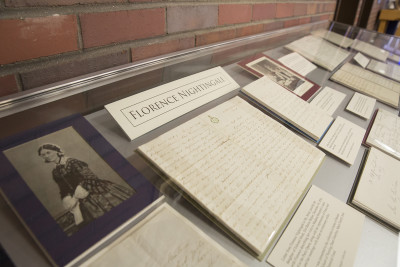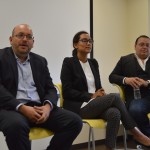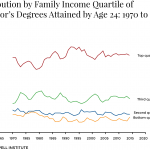
The Boston University Howard Gotlieb Archival Research Center now hosts the online portal to approximately 1,900 of Florence Nightingale’s digitally archived items. The Florence Nightingale Digitization Project, which started in 2014, allows researchers to use a single source to access Nightingale’s legacies, according to the center’s website.
Sean Noel, associate director of the HGARC, said the collection is the largest outside of the United Kingdom and explores Nightingale’s lasting impact in a variety of topics.
“Florence Nightingale is one of those figures that has international recognition,” Noel said. “It’s exciting to be able to perpetuate the legacy and legend of the person, but the specifics of their life and career are also very important.”
Nightingale is widely known to have developed ideas in hospital administration, sanitation and patient care during the Crimean War. Nightingale’s letters contain detailed theories on different areas of nursing that were later adopted into medical practices worldwide, Noel said.
HGARC director Vita Paladino pioneered the Florence Nightingale Digitization Project in 2014 in collaboration with London’s Florence Nightingale Museum, the Royal College of Nursing and the Wellcome Library, according to the HGARC website.
The project aims to develop a public online database of Nightingale’s digitized letters hosted by BU through Archive Manager, a web-based application for collaborative database. BU currently has a collection of more than 300 letters of Nightingale’s written to a variety of correspondents, BU Digital Communications Assistant Margaret Waterman wrote in an email.
Waterman added that a number of Nightingale’s physical archives can be found in the Mugar Memorial Library.
Noel said the site’s design is geared toward connecting researchers with institutions to further their understanding in a given subject.
“It’s a richer experience, I think, and when you find the item you’re interested in, you can see either the actual object in our database or it will take you to their website,” he said.
The project is the result of collaboration among several institutions and has forged international scholastic relationships, Noel said. More partners are in the process of joining the project, the website stated.
Noel said the online portal is designed to be accessible to anyone interested in any topic, and the artifacts are tagged by location to encourage in-person research if possible.
“On the site, you’ll find a chance to search by individual repository,” he said. “Or you could find what is just at BU so you could see the originals in person, or you can put in a search term.”
The online portal is not only organized for ease of access, but also for context on the information and artifacts in the archive, Noel said.
“Users can dig into the data in a way that is different from other archives, which are just two-dimensional lists of information,” Noel said. “This is more relational structure, as objects are tagged with subject headings so you can see things that are in common, dig into the data and maybe go in directions you might not have expected to go in.”
Several students said an online portal to extensive database is helpful for their research needs and eases their data navigation.
Savanah MacDonald, a freshman in the College of Communication, said the archives are as impressive as they are resourceful.
“The archive collection is incredible,” she said. “I appreciate how dedicated [HGARC has] been with collecting all the material there. It’s not only a good resource for students to do research but also interesting and inspirational.”
Mario Lopez, a sophomore in the College of Arts and Sciences, said online archives deepen research.
“I have used archives for scientific articles,” he said. “But the databases are easy to navigate no matter what you’re researching. That’s encouraging for research.”
Bruno Lin, a sophomore in the College of Engineering, said the online access to digitized archives eases his research process.
“I have never gone to Mugar to do research in person,” he said, “but I have used online archives and I think they’re useful, so I think it’s great for BU to acquire more material.”




